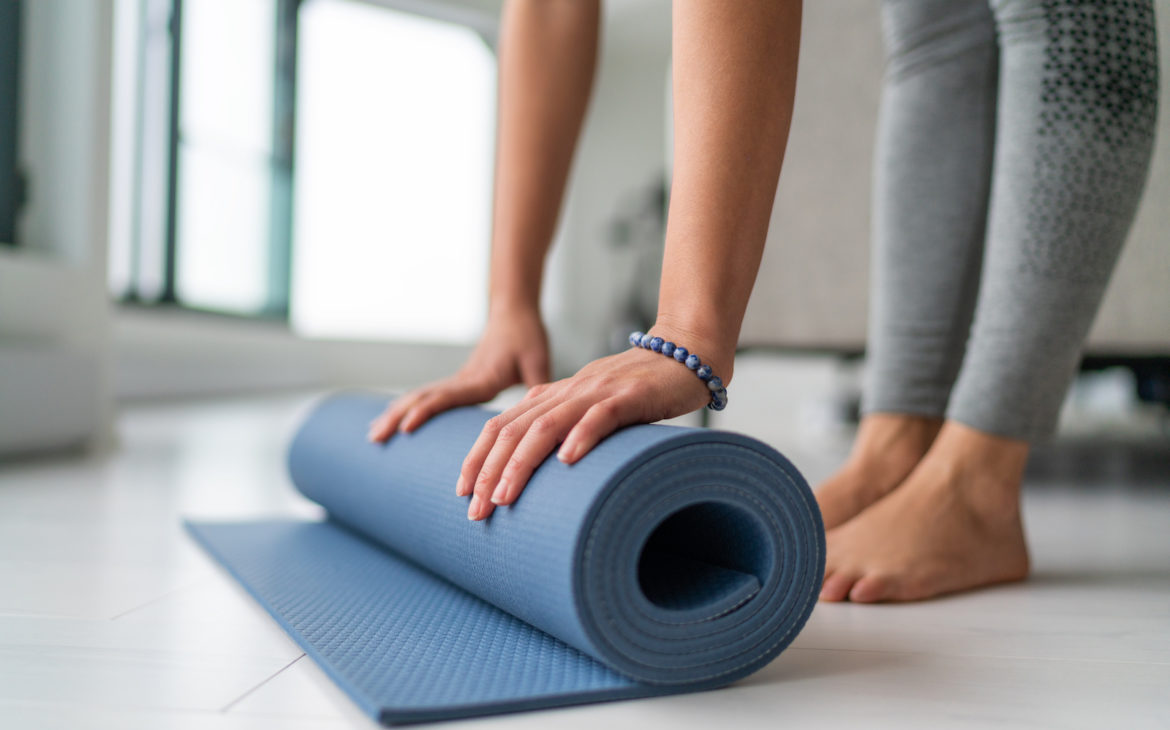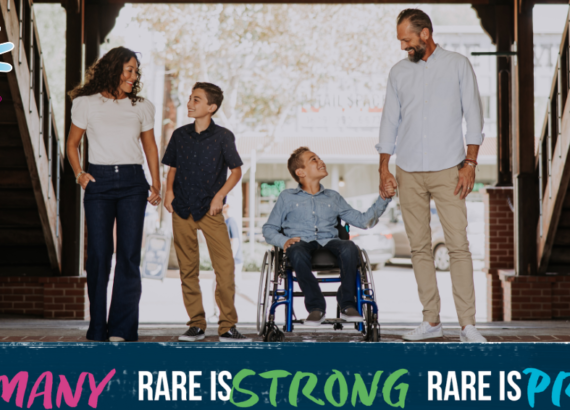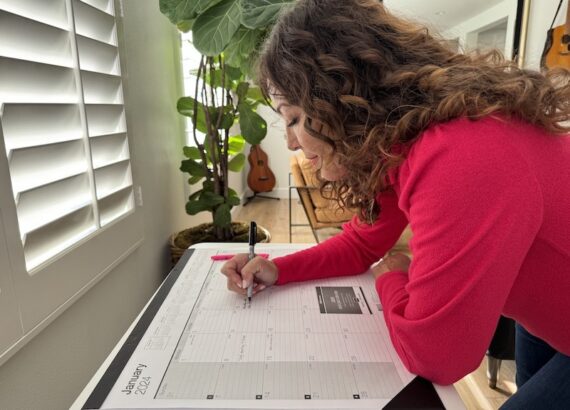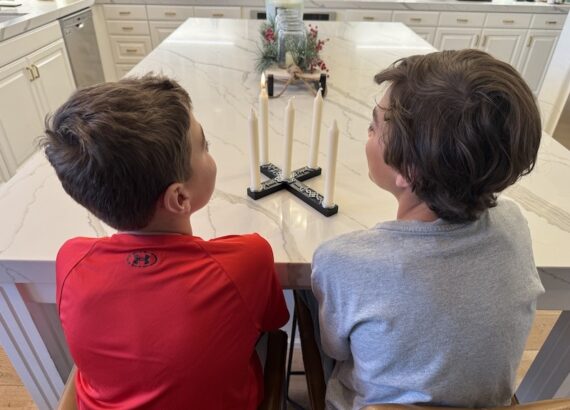Rare-Disease Caregiving: Mama Needs a Break!

If you truly want to help your child, you’ll need to invest time in taking care of yourself. Rare-disease caregiving can be all-consuming. But if mama goes down, the whole ship can sink.
Take care of yourself. Yeah, yeah, yeah. You’ve heard it all before. Everyone tells you this. “Make sure to take care of yourself,” they say. But when are we supposed to take care of ourselves? At ten o’clock at night when everything is finally done and we have absolutely zero energy and nothing is more important than sleep?
Ladies, let me tell you this one is real. It took back problems, a sprained ankle, and a torn meniscus in my knee for me to realize that I needed to slow down and take care of myself. For real, don’t learn the hard way. It only makes things … well … harder.
Having a child with a disability can affect you in many ways that you may not even realize. Rare-disease caregiving is not for the faint of heart. When I talk about taking care of yourself, I mean nurturing your whole self, including your mental, emotional, physical, and relational needs. I’m talking about finding a healthy balance in your mind, body, and spirit. When you’re time-starved, sleep-deprived, and anxiety-filled, this is extremely hard to do, but, mama, it’s necessary for so many reasons.
If you truly want to help your child, you’ll need to invest time into taking care of yourself. Because if mama goes down, the whole ship can sink. Let’s talk about how to take care of your whole self.
Mental/Emotional

It’s common for the emotional strain of rare-disease caregiving to become overwhelming. Many moms need help sorting through their feelings. At the same time, they worry that if they dive into their emotions too deep, the whole well will explode and they’ll drown in their sea of feelings. I can certainly understand that. But feelings and emotions are funny; they often surface whether you want them to or not. You may choose to shove them down, but at some point, they’ll bubble up and trickle out. They may even manifest themselves in other ways such as physical injury or illness. So you may want to just deal with them outright.
How can you nurture your mental and emotional well-being? Some moms choose to spend time alone (easier said than done, I know)—reading, praying, meditating, writing, journaling, or being in nature, to name a few examples. Quiet time by themselves helps them refuel and reflect. This reflection time is so important when the world around you is moving at one hundred miles per hour. Time to slow down and reflect allows you to process what’s happening and how it’s making you feel. Sometimes you have to feel all your feelings in order to move through them. Click here to check out the inspiration section of the blog for a few insights to reflect on that may help with rare-disease caregiving.
Other moms pour their emotional and mental energy into meaningful action such as advocating for their child’s disease or helping other moms and children with the same diagnosis. Some of these moms have told me that doing something proactive helps them feel less powerless over their child’s condition. It helps them feel like they’re contributing and making positive change. It also helps them connect with a community of like-minded women focused on the same goal.
Some moms seek support and comfort through family and friends. Talking with a confidante about how you’re feeling and dealing can help release those emotions. Though your family and friends may not be able to completely identify with what you’re going through, they can still be an ear to listen. Sometimes just voicing your feelings allows for a release of all the tension that surrounds them. Having others around you know what you are going through on a daily basis provides opportunities for them to support you.
If you start to change your thoughts and feelings from fear, ineptness, and confusion to bravery, competency, and ability, you’ll cultivate those very things in your life.
Many moms choose to seek professional help. Since having a child with a rare disease comes with a whole new set of rules and ways of doing things, and since rare-disease caregiving can be overwhelming, it can be helpful to see a professional who can provide clarity. A therapist or counselor can be an unbiased third-party with whom you share your feelings and who can help you learn to cope with your new normal. If you think this may be helpful, seek out a family therapist who has experience with chronic illness. If you feel the emotional strain taking a toll, don’t be afraid to ask for help.
Whatever helps you process and work through your emotions to keep you in the best mental state is worth the investment of your time. You’ll be thrown so much information during this journey, and you will need clarity of mind to have good comprehension, judgment, and discernment. Your mind is a powerful tool that can be sharpened, tuned, and polished. It’s an important part of your whole self that can help keep the other parts in balance.
As well, your thoughts and feelings often control how you see and interpret things. If you start to change your thoughts and feelings from fear, ineptness, and confusion to bravery, competency, and ability, you’ll cultivate those very things in your life. Your mindset has the ability to shape your reality. Find ways and outlets that allow you to work through your emotions and keep your mental well-being balanced.
Physical

Because the mind and body are interconnected and affect each other tremendously, it’s important that we pay attention to the ways our mind can affect our physical health. Many moms feel the effects of the stress of rare-disease caregiving on their bodies. According to Mayo Clinic, stress can cause physical effects and changes such as headache, muscle tension, pain, fatigue, stomach upset, change in sex drive, weight loss, weight gain, and sleep problems among others.[i]
In addition, because moms are caregivers and the caregiving requirements for a child with a rare disease are significant, a mama’s body is often working overtime. You may be doing tasks that your child is unable to do. You may be lifting, transferring, holding, toileting, bathing, dressing, feeding, etc. This can put physical strain on your body. It’s important to know this going in and come up with strategies for staying healthy. Mayo Clinic suggests getting regular physical activity, stretching to avoid injury, and practicing relaxation techniques such as deep breathing, meditation, yoga, tai chi, or massage.
Often, if you don’t give your body a break, your body will make you take a break—be it from injury or illness. Then what? How will you care for your children if you’re sick or injured?
Our bodies are our vessels and they need certain basic things like sleep, exercise, and good nutrition. When we have a child with a rare condition, we’re typically so focused on their well-being that ours can go right out the door. We may be running them around to physical therapy, swim therapy, and horse-riding therapy but haven’t done any exercise or physical activity ourselves in years. We may be working with occupational therapists and nutritionists to make sure our children have feeding abilities and are getting proper nutrition, and yet there we are grabbing a fistful of goldfish crackers and calling it lunch as we rush out the door to get to appointments. I mean, yes, we know better, but we just don’t have the time. This is our reality.
And sleep? Don’t even get me started about sleep! Who can sleep when things around us are in chaos or while we’re wrestling with difficult information? Not to mention so many of us have children who are unable to sleep through the night due to their condition. And if they aren’t sleeping, we aren’t sleeping. Yet sleep is of the utmost importance. When we don’t sleep, our bodies are tired, our mind is in a fog, and we have less patience and bandwidth for all the things we need to do.
The truth is, in our situation with rare-disease caregiving, it’s extremely difficult to do the very things that will help us. But focusing on our own physical health has to be a vital part of our new routine. Just like you take good care of your child, take good care of you too, mama.
Keep your body stretched so it doesn’t get tight. When it’s tight, you’re more prone to injury, especially if you are physically lifting or carrying your child. Move your body and get your blood pumping; not only is it good for your physical health, but it lets out endorphins, and that’s good for you mentally. So much of this goes hand in hand. Eat a whole, balanced diet. I’m not talking about some gourmet dinner that you have no time to cook; I mean be sure you get your vegetables, fruits, protein, and vitamins to ensure your body has the proper intake to fuel you.
Give your aching paws a break. Rest. Put your feet up. Close your eyes when you can. Refresh. Take care of that precious vessel so it’s in top working condition.
Spiritual
With so much stressful information and situations in your life, how will you keep your soul and spirit intact? How will you battle the thoughts that can turn you bitter? How will you keep your light shining in the darkness? Your spiritual well-being is an important part of keeping you balanced while you are rare-disease caregiving.
Now is the time, more than ever before, to feed your soul. I know we all come from different backgrounds and different beliefs. I don’t know where you are in your spiritual journey, but let me ask you right now: If you haven’t considered your faith, might you consider it now? For me, it’s been an anchor in this stormy sea. I feel God’s love more than ever before. That may seem strange to say considering my child was diagnosed with a severe disease, but I have felt God’s presence and His hand in my family’s life. We’ve asked and we’ve received. If you haven’t yet, consider strengthening your relationship with God and seeing if He provides you that grounding anchor and the hope, we all so desperately need. God loves you and is waiting for you.

You can either let this experience diminish your faith or awaken it.
I have let it awaken my faith and though I would never push my beliefs on anyone that is not interested, I do want to offer my experience for those that are. Strengthening my spiritual life has helped me cope and has given me more peace than I ever thought was possible at the most difficult time of my life.
These are some of the steps I learned that helped me along my way.
Pray your heart out. Converse with God daily. Express all your feelings, hurts, and hang-ups to Him. Feel His presence in your life. Expect Him to help you. Trust that He will. Give it up to Him.
Pray your way through your day. At each point, at each turn, at each confusing decision, with each fearful step, during each hard circumstance, and with each sad or bitter thought—pray it away. When you don’t know the answer, when you don’t know where to turn, and when there seems to be no way—pray!
I have been absolutely blown away by God’s power and His ability to take my worries, confusion, and never-ending questions and calm my soul in the midst of the storm. While the boat was rocking, while I couldn’t find a paddle, and while I was scared I would fall overboard, He helped me sit calmly through it. No, the storm didn’t stop. It raged on through the night—dark, windy, and wet—yet there I sat. Right there in it. And you know what happened? Eventually, it stopped. The wind ceased blowing, the sea calmed, and the sun rose. I was tired, wet, and wind-blown, but I lived through it with a peace that didn’t come from my own making. Then I realized God was driving the boat. He was the master captain.
Remember, when you’re going through a stormy time in your life, to focus on God instead of on your troubles. He is able to stretch out His hand and walk with you through the raging waters. Call to Him and ask Him to come into your boat. When we let Him take the helm, He can calm the storms of life.
Your spiritual health is an important part of your balance and the balance needed in rare-disease caregiving. Feed your soul what it needs to stay light and bright in weary, dreary times.
Relational

One of the sad strains that comes with this road is the strain on relationships. It can affect your relationship with friends and extended family, immediate family, and your spouse if you’re married.
Rare caregiving requires a lot of your time. That means you have less time to spend with your friends, less time to spend with your family, and less time to spend with your spouse. This can produce distanced relationships. Going into this jungle, you’ll want to be conscious that this potential exists.
If you’re married, it will be extremely important to take breaks with your spouse. In fact, it’s a good idea to come up with a plan for navigating this road together. Each person reacts differently to a diagnosis and handles stress in a different way. Each grieves differently and heals differently. Allow each other space for coming to terms with the diagnosis in their own way and in their own time. Then collaborate on a plan so you can walk down this road as a team.
It will also be so important to spend time alone together. This can be difficult when you have a child with a complex medical condition, but if you can find a way to get care for your child so you and your spouse have a break together and you have a break from rare caregiving, it will be so worth it. The two of you are still the foundation of your family. You’ll need to keep your foundation strong and intact so it doesn’t crack under the pressure. You’ll need breaks from rare-disease caregiving together. You’ll need moments together when you don’t focus on your situation at all, but instead laugh and have fun together. This may not be possible at first, but when you get to a point in your journey when you and your spouse can take a break from caregiving, make sure you do.
Listen, I know you probably already know a lot of these things, but sometimes because of our situation, we think the rules don’t apply to us. However, these rules apply now more than ever. Sometimes us moms are stubborn and say, “I’m okay,” “I don’t need a break,” “I’ll be fine,” “I’ll rest tomorrow,” and “I’ll take care of myself when things die down.” Even though we know better, we ignore our needs and put ourselves last. Or we’re so busy with rare-disease caregiving that we just forget. Or there’s so much to do that we don’t prioritize ourselves. Sometimes we just need a reminder. Sometimes we just need permission.
Consider this your big flashing reminder and your letter of permission:
Mama, your health and well-being are more important now than ever before. Just as your child is worthy of good care, you are worthy of good self-care. It’s vital to spend time taking care of yourself. By the authority of all the rare disease mamas who have gone before you, I hereby grant you permission to rest when you can and take good care of YOU!

[i] “Stress symptoms: Effects on your body and behavior,” Mayo Clinic, https://www.mayoclinic.org/healthy-lifestyle/stress-management/in-depth/stress-symptoms/art-20050987.







